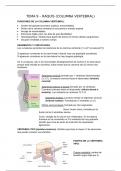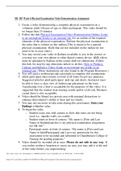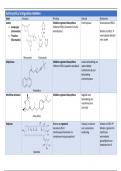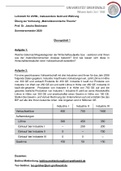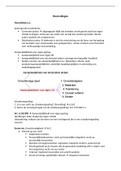Medicare Part A Coverage -✔✔Hospital insurance that covers inpatient and most skilled care.
Mandatory copays for hospital days 21-150, getting higher with each period of time.
Medicare Part A Eligibility -✔✔>65 in social security automatic enrollment
Medicare Part A Cost -✔✔No cost if automatically qualified. 30-39 work quarters: ~$250/mo <30 work
quarters: ~$450/mo
Medicare Part B Coverage -✔✔Supplemental medical insurance. Outpatient services, care,
physical/speech therapy, some home health care, medical equipment
Medicare Part B Eligibility -✔✔Voluntary if >65
Medicare Part B Cost -✔✔Deducted from monthly social security check. *Enroll 3 months before 65th
birthday or 4 months after, otherwise increased costs to enroll*
Medicare Part C -✔✔Medicare Advantage. Get all their medical services through that plan.
Medicare Part D coverage -✔✔Prescription drug coverage
Medicare Part D Cost -✔✔Varies depending on how extensive drug benefit is. Different plans have
different benefits.
Medigap Plans -✔✔Fill gaps in coverage that occur with Medicare
,Medicare Advantage Plan -✔✔Will likely eliminate need for medigap insurance?
Medicaid Eligibility -✔✔Automatic coverage not guaranteed except for poor pregnant women and
children. States can refuse to cover adults/head of households who lose Temporary Assistance to Needy
Families d/t refusal to work. Generally covers poor people.
Medicaid funding -✔✔Federal + state. States determine how much they want to pay in, different states
have different qualities of Medicaid
HMO -✔✔Four components: Enrolled population, prepayment of premiums, coverage of
comprehensive medical svcs, centralization of medical and hospital svcs
Closed-panel HMO -✔✔Specific providers identified by plan to provide the medical services to
members. Staff can be salaried by HMO or an agency/group contracted by the HMO.
Open-panel HMO -✔✔Network HMO, Individual Practice Association, Point of Service Plans
Network HMO -✔✔HMO contracts with more than one group of practices
Individual Practice Association -✔✔Insurance coverage. Contract with an association of physicians to
provide services to members
Point of Service (POS) and Preferred Provider Organizations (PPOs) -✔✔Insurance coverage. Patients
allowed to self-refer to specialist but pay higher premium to do so. POS requires PCP is gatekeeper but
pt can see a provider outside of HMO for more $$. PPOs contract to a selected group of participating
providers and give discount for using a selected group of providers. Financial risk held by insurer in PPO,
held by providers in POS
,Managed indemnity -✔✔Traditional model insurance coverage.. Pre-certification, catastrophic case
management, minimal contract arrangement with providers. Provider groups and health plans can use
quality control, utilization review, bundling of services, incentives for health behaviors. MUST seek
National Committee on Quality Assurance (NCQA) accreditation
Licensure -✔✔Member of profession is granted ability to practice
Accreditation -✔✔Formal review and approval by a recognized agency of
educational degree or certification programs in nursing or nursing-related programs.
Certification -✔✔Tests knowledge, skills, abilities for entry into practice. Formal recognition of the
knowledge, skills, and experience
demonstrated by the achievement of standards identified by the profession
Education -✔✔Formal preparation of APRNs in graduate degree-granting or postgraduate
certificate programs
Factors facilitating NP growth -✔✔Demand for svcs, acceptance of role, emphasis on integrated
healthcare svcs, emergence of PMHNP and decreasing stigmatization
Factors constraining NP growth -✔✔Growth competition, reimbursement struggles, overlapping scopes
with other NPs, concerns about reimbursement fraud/abuse, scope of practice requiring physician
supervision/collab
Exceptions to confidentiality -✔✔Information given to attorneys involved in litigation, records to
insurance companies, answering court orders, mandatory state reporting, harm to self or others or
child/elder abuse, determined need for info outweighs principle of confidentiality
, Deontological Theory -✔✔Action is judged as good or bad based on the act itself regardless of the
consequences
Teleological Theory -✔✔An action is judged as good or bad based on the consequence or outcome
Virtue Ethics -✔✔Actions are chosen based on moral virtues (honesty, courage, compassion, etc) or the
character of the person making the decision
Elements of negligence that must be established to prove malpractice -✔✔Duty, breach of duty,
proximate cause, damages
Duty (negligence) -✔✔NP had a duty to exercise reasonable care when undertaking and providing
treatment to the client
Breach of duty (negligence) -✔✔The NP violated the applicable standard of care in treating the client's
condition
Proximate cause (negligence) -✔✔There is a causal relationship between the breach in the standard of
care and the client's injuries
Damages (negligence) -✔✔Client experiences permanent and substantial damages as a result of the
breach in the standard of care
Competency: Legal or medical? -✔✔Legal (NOT medical)
Competency -✔✔Determination that a client can make reasonable judgments and decisions regarding
treatment and other health concerns


